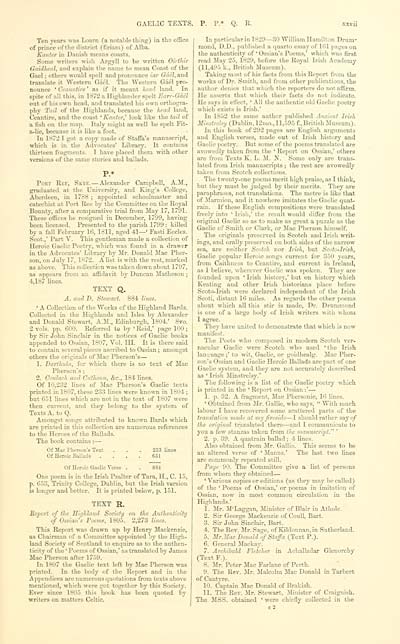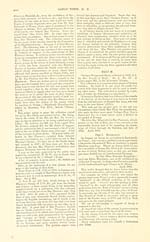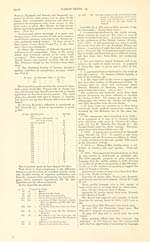Download files
Complete book:
Individual page:
Thumbnail gallery: Grid view | List view

GAELIC TEXTS. P. P.* Q. E.
Ten vears was Loarn (a notable thing) in the office
of prince of the district (fii-iain) of Alba.
Kanier in Danish means coasts.
Some -writers wi.sh Argyll to bo written Oirthir
Gaidheal, and explain the name to mean Coast of the
Gael ; others would spell and pronounce iar Gael, and
translate it Western Gael. The Western Gael pro-
nounce ' Ceaniitire' as if it meant head land. In
spite of all this, in 1872 a Highlander spelt Earr-Gàèl
out of his own head, and translated his own orthogra-
phy Tail of the Highlands, because the head land,
Ceantire, and the coast ^ Kantor,' look like the tail of
a fish on the map. Italy might as well to spelt Fit-
a-lie, because it is like a foot.
In 1872 I got a copy made of Staffa's manuscript,
which is in the Advocates' Library. It contains
thirteen fragments. I have placed them with other
versions of the same stories and ballads.
Port Ree, Skte. — Alexander Campbell, A.M.,
graduated at the University, and King's College,
Aberdeen, in 1788 ; appointed schoolmaster and
catechist at Port Ree by the Committee on the Royal
Bounty, after a comparative trial ii-om May 17, 1791.
These offices he resigned in December, 1799, having
been licensed. Presented to the parish 1799 : killed
by a fall February 16, 1811, aged 41—' Fasti Eccles.
Scot.,' Part V. This gentleman made a collection of
Heroic Gaelic Poetry, which was found in a drawer
in the Advocates' Library by Mr. Donald ilac Pher-
son, on July 17, 1872. A list is with the rest, marked
as above. This collection was taken down about 1797,
as appears from an affidavit by Duncan ilatheson ;
4,187 hues.
TEXT Q,.
A. and D. Sfeicart. 884 Ihies.
' A Collection of the Works of the Highland Bards.
Collected in the Highlands and Isles by Alexander
and Donald Stewart, A.M., Edinburgh, 1804.' 8vo.
2 vols. pp. 600. Referred to by 'Reid,' page 100 ;
by Sir John Sinclair in the notices of Gaelic books
appended to Ossian, 1807, Vol. III. It is there said
to contain several pieces ascribed to Ossian ; amongst
others the originals of Mao Pherson's —
1. Darihula, for which there is no test of Mac
Pherson's ;
2. Conlach and Cuthonn, &c., 184 lines.
Of 10,232 lines of Mac Pherson's Gaelic texts
printed in 1807, these 233 lines were known in 1804 ;
but 651 Hnes which are not in the text of 1807 were
then current, and they belong to the .system of
Texts A. to Q.
Amongst songs attributed to known Bards which
are printed in this collection are numerous references
to the Heroes of the Ballads.
The book contains : —
Of Mac Pherson's Text ... 233 lines
Of Heroic Gaelic A'erse . . 8S4
One poem is in the Irish Psalter of Tara, H., C. 15,
p. 653, Trinity College, Dublin, but the Irish version
is longer and better. It is printed below, p. 151.
TEXT R,
Report of the Hic/hland Society on the Authenticity
of Ossian's Poems, 1805. 2,273 lines.
This Report was drawn up by Henry Mackenzie,
as Chairman of a Committee appointed by the High-
land Society of Scotland to enquire as to the authen-
ticity of the ' Poems of Ossian,' as translated by James
Mac Pherson after 1759.
In 1807 the Gaelic text left by Mac Pherson was
printed. In the body of the Report and in the
Appendices are numerous quotations from texts above
mentioned, which were got together by this Society.
Ever since 1805 this hook has been quoted by
writers on matters Celtic.
In particular in 1829—30 William Hamilton Drum-
mond, D.D., published a quarto essay of 161 pages on
the authenticity of ' Ossian's Poems,' which was first
read May 25, 1829, before the Royal Irish Academy
(11,495 k., British Museum).
Taking most of his facts from this Report from the
works of Dr. Smith, and from other publications, the
author denies that which the reporters do not affirm.
He asserts that which their facts do not indicate.
He says in effect, ' All the authentic old Gaelic poetry
which exists is Irish.'
In 1852 the same author published Ancient Irish
Minstrelsy (Dublin, 12mo., 11,596 f.,British Museum).
In this book of 292 pages are English arguments
and English verses, made out of Iri.sh history and
Gaelic poetry. But some of the poems translated are
avowedly taken from the ' Report on Ossian,' others
are from Texts K. L. M. N. Some only are trans-
lated from Irish manuscripts ; the rest are avowedly
taken from Scotch collections.
The twenty-one poems merit high praise, as I think,
but they must be judged by their merits. They are
paraphrases, not translations. The metre is like that
of Marmion, and it nowhere imitates the Gaelic quat-
rain. If these English compositions were translated
freely into ' Irish,' the result would differ from the
original Gaelic so as to make as great a puzzle as the
Gaelic of Smith or Clark, or ilac Pherson himself.
The originals preserved in Scotch and Irish writ-
ings, and orally preserved on both sides of the narrow
sea, are neither Scotch nor Irish, but Scato-Irish,
Gaelic popular Heroic songs current for 350 years,
from Caithness to Ceantire, and current in Ireland,
as I beheve, wherever Gaelic was spoken. They are
founded upon ' Ii'ish history,' but on history which
Keating and other Irish historians place before
Scoto-Irish were declared independent of the Irish
Scoti, distant 16 miles. As regards the other poems
about which all this stir is made. Dr. Drurnmond
is one of a large body of Irish writers with whom
I agree.
They have united to demonstrate that which is now
manifest.
The Poets who composed in modern Scotch ver-
nacular Gaelic were Scotch who used ' the Irish
language ;' to wit, Gaelic, or goidhealg. Mac Pher-
son's Ossian and Gaelic Heroic Ballads are part of one
Gaelic system, and they are not accurately described
as ' Irish Minstrelsy.'
The following is a list of the Gaelic poetry which
is printed in the ' Report on Ossian :' —
1. p. 32. A fragment, Mac Phersonic, IG lines.
' Obtained from Mr. Gallic, who says, " With much
labour I have recovered some scattered parts of the
translation made at my fireside — I should rather sayo/
the original translated there — and I communicate to
you a few stanzas taken from the manuscript." '
2. p. 39. A quatrain ballad; 4 lines.
Also obtained from Mr. Gallic. This seems to be
an altered verse of ' Manus.' The last two lines
arc commonly repeated still.
Paye 90. The Committee give a list of persons
from whom they obtained —
' Various copies or editions (as they may be called)
of the ' Poems of Ossian,' or poems in imitation of
Ossian, now in most common circulation in the
Highlands.'
1 . Mr. M'Laggan, Minister of Blair in Athole.
2. Sir George Mackenzie of Coull, Bart.
3. Sir John Sinclair, Bart.
4. The Rev. Mr. Sage, of KJildonnan, in Sutherland.
5. Mr.Mac Donald rf Staff a (Text P.).
6. General Mackay.
7. Archibald Fletcher in Achalladar Glenorchy
(Text F.).
8. ilr. Peter Mac Farlane of Perth.
9. The Rev. Mr. Malcolm Mao Donald in Tarbert
of Cantyre.
10. Captain Mac Donald of Brakish.
11. The Rev. Mr. Stewart, INIinister of Craignish.
The MSS. obtained ' were chiefly collected in the
c2
Ten vears was Loarn (a notable thing) in the office
of prince of the district (fii-iain) of Alba.
Kanier in Danish means coasts.
Some -writers wi.sh Argyll to bo written Oirthir
Gaidheal, and explain the name to mean Coast of the
Gael ; others would spell and pronounce iar Gael, and
translate it Western Gael. The Western Gael pro-
nounce ' Ceaniitire' as if it meant head land. In
spite of all this, in 1872 a Highlander spelt Earr-Gàèl
out of his own head, and translated his own orthogra-
phy Tail of the Highlands, because the head land,
Ceantire, and the coast ^ Kantor,' look like the tail of
a fish on the map. Italy might as well to spelt Fit-
a-lie, because it is like a foot.
In 1872 I got a copy made of Staffa's manuscript,
which is in the Advocates' Library. It contains
thirteen fragments. I have placed them with other
versions of the same stories and ballads.
Port Ree, Skte. — Alexander Campbell, A.M.,
graduated at the University, and King's College,
Aberdeen, in 1788 ; appointed schoolmaster and
catechist at Port Ree by the Committee on the Royal
Bounty, after a comparative trial ii-om May 17, 1791.
These offices he resigned in December, 1799, having
been licensed. Presented to the parish 1799 : killed
by a fall February 16, 1811, aged 41—' Fasti Eccles.
Scot.,' Part V. This gentleman made a collection of
Heroic Gaelic Poetry, which was found in a drawer
in the Advocates' Library by Mr. Donald ilac Pher-
son, on July 17, 1872. A list is with the rest, marked
as above. This collection was taken down about 1797,
as appears from an affidavit by Duncan ilatheson ;
4,187 hues.
TEXT Q,.
A. and D. Sfeicart. 884 Ihies.
' A Collection of the Works of the Highland Bards.
Collected in the Highlands and Isles by Alexander
and Donald Stewart, A.M., Edinburgh, 1804.' 8vo.
2 vols. pp. 600. Referred to by 'Reid,' page 100 ;
by Sir John Sinclair in the notices of Gaelic books
appended to Ossian, 1807, Vol. III. It is there said
to contain several pieces ascribed to Ossian ; amongst
others the originals of Mao Pherson's —
1. Darihula, for which there is no test of Mac
Pherson's ;
2. Conlach and Cuthonn, &c., 184 lines.
Of 10,232 lines of Mac Pherson's Gaelic texts
printed in 1807, these 233 lines were known in 1804 ;
but 651 Hnes which are not in the text of 1807 were
then current, and they belong to the .system of
Texts A. to Q.
Amongst songs attributed to known Bards which
are printed in this collection are numerous references
to the Heroes of the Ballads.
The book contains : —
Of Mac Pherson's Text ... 233 lines
Of Heroic Gaelic A'erse . . 8S4
One poem is in the Irish Psalter of Tara, H., C. 15,
p. 653, Trinity College, Dublin, but the Irish version
is longer and better. It is printed below, p. 151.
TEXT R,
Report of the Hic/hland Society on the Authenticity
of Ossian's Poems, 1805. 2,273 lines.
This Report was drawn up by Henry Mackenzie,
as Chairman of a Committee appointed by the High-
land Society of Scotland to enquire as to the authen-
ticity of the ' Poems of Ossian,' as translated by James
Mac Pherson after 1759.
In 1807 the Gaelic text left by Mac Pherson was
printed. In the body of the Report and in the
Appendices are numerous quotations from texts above
mentioned, which were got together by this Society.
Ever since 1805 this hook has been quoted by
writers on matters Celtic.
In particular in 1829—30 William Hamilton Drum-
mond, D.D., published a quarto essay of 161 pages on
the authenticity of ' Ossian's Poems,' which was first
read May 25, 1829, before the Royal Irish Academy
(11,495 k., British Museum).
Taking most of his facts from this Report from the
works of Dr. Smith, and from other publications, the
author denies that which the reporters do not affirm.
He asserts that which their facts do not indicate.
He says in effect, ' All the authentic old Gaelic poetry
which exists is Irish.'
In 1852 the same author published Ancient Irish
Minstrelsy (Dublin, 12mo., 11,596 f.,British Museum).
In this book of 292 pages are English arguments
and English verses, made out of Iri.sh history and
Gaelic poetry. But some of the poems translated are
avowedly taken from the ' Report on Ossian,' others
are from Texts K. L. M. N. Some only are trans-
lated from Irish manuscripts ; the rest are avowedly
taken from Scotch collections.
The twenty-one poems merit high praise, as I think,
but they must be judged by their merits. They are
paraphrases, not translations. The metre is like that
of Marmion, and it nowhere imitates the Gaelic quat-
rain. If these English compositions were translated
freely into ' Irish,' the result would differ from the
original Gaelic so as to make as great a puzzle as the
Gaelic of Smith or Clark, or ilac Pherson himself.
The originals preserved in Scotch and Irish writ-
ings, and orally preserved on both sides of the narrow
sea, are neither Scotch nor Irish, but Scato-Irish,
Gaelic popular Heroic songs current for 350 years,
from Caithness to Ceantire, and current in Ireland,
as I beheve, wherever Gaelic was spoken. They are
founded upon ' Ii'ish history,' but on history which
Keating and other Irish historians place before
Scoto-Irish were declared independent of the Irish
Scoti, distant 16 miles. As regards the other poems
about which all this stir is made. Dr. Drurnmond
is one of a large body of Irish writers with whom
I agree.
They have united to demonstrate that which is now
manifest.
The Poets who composed in modern Scotch ver-
nacular Gaelic were Scotch who used ' the Irish
language ;' to wit, Gaelic, or goidhealg. Mac Pher-
son's Ossian and Gaelic Heroic Ballads are part of one
Gaelic system, and they are not accurately described
as ' Irish Minstrelsy.'
The following is a list of the Gaelic poetry which
is printed in the ' Report on Ossian :' —
1. p. 32. A fragment, Mac Phersonic, IG lines.
' Obtained from Mr. Gallic, who says, " With much
labour I have recovered some scattered parts of the
translation made at my fireside — I should rather sayo/
the original translated there — and I communicate to
you a few stanzas taken from the manuscript." '
2. p. 39. A quatrain ballad; 4 lines.
Also obtained from Mr. Gallic. This seems to be
an altered verse of ' Manus.' The last two lines
arc commonly repeated still.
Paye 90. The Committee give a list of persons
from whom they obtained —
' Various copies or editions (as they may be called)
of the ' Poems of Ossian,' or poems in imitation of
Ossian, now in most common circulation in the
Highlands.'
1 . Mr. M'Laggan, Minister of Blair in Athole.
2. Sir George Mackenzie of Coull, Bart.
3. Sir John Sinclair, Bart.
4. The Rev. Mr. Sage, of KJildonnan, in Sutherland.
5. Mr.Mac Donald rf Staff a (Text P.).
6. General Mackay.
7. Archibald Fletcher in Achalladar Glenorchy
(Text F.).
8. ilr. Peter Mac Farlane of Perth.
9. The Rev. Mr. Malcolm Mao Donald in Tarbert
of Cantyre.
10. Captain Mac Donald of Brakish.
11. The Rev. Mr. Stewart, INIinister of Craignish.
The MSS. obtained ' were chiefly collected in the
c2
Set display mode to: Large image | Transcription
Images and transcriptions on this page, including medium image downloads, may be used under the Creative Commons Attribution 4.0 International Licence unless otherwise stated. ![]()
| Early Gaelic Book Collections > Ossian Collection > Leabhar na Feinne > (31) |
|---|
| Permanent URL | https://digital.nls.uk/80030293 |
|---|
| Description | Selected books from the Ossian Collection of 327 volumes, originally assembled by J. Norman Methven of Perth. Different editions and translations of James MacPherson's epic poem 'Ossian', some with a map of the 'Kingdom of Connor'. Also secondary material relating to Ossianic poetry and the Ossian controversy. |
|---|
| Description | Selected items from five 'Special and Named Printed Collections'. Includes books in Gaelic and other Celtic languages, works about the Gaels, their languages, literature, culture and history. |
|---|

